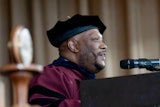Just months after the election of the nation’s first Black president, in which African-American voter registration and voter turnout was at its highest, the U.S. Supreme Court will hear arguments today on whether states with a history of racial discrimination at the polls still need federal oversight.
At issue is the Voting Rights Act of 1965, which was reauthorized in 2006. It mandates that certain state and local governments must obtain permission from the Justice Department or a federal court before making a decision that affects voting processes. The statute currently applies to nine states – Alabama, Alaska, Arizona, Georgia, Louisiana, Mississippi, South Carolina, Texas and Virginia – and dozens of counties and municipalities in other states.
In the case Northwest Austin Municipal Utility District Number One v. Holder, the municipal utility district in Austin, Texas, is arguing that it should not be required to consult the Justice Department to change a polling station or for any other change in voting processes on the grounds that it has never been accused of voter discrimination. In fact, the utility district did not exist until the mid-1980s, long after Jim Crow reigned supreme in the South.
But the Justice Department, led by Attorney General Eric Holder, is arguing that the preclearance statute serves to protect people of color from being disenfranchised at the polls.
The utility district straddles the Williamson and Travis county lines with the majority of the district falling in Williamson. There, minorities constitute 30 percent of the population, according to the U.S. Census Bureau.
The Voting Rights Act of 1965 was signed into law by President Lyndon B. Johnson after a series of violent attacks on civil rights marchers in the South demanding the right to vote. The law quelled such ploys as poll taxes and literacy requirements for voting registration instituted by lawmakers to disenfranchise Black populations.
Section 5 is the linchpin of the legislation, says Raymond Pierce, dean of North Carolina Central University’s College of Law and former U.S. Department of Education Deputy Assistant Secretary for Civil Rights. He adds that, without the preclearance, the law has little power.
“Given all the voting irregularity in 2000 in Florida, which resulted in about a week’s delay in declaring the winner of the presidency of the United States, I would say Section 5 is necessary,” says Pierce. “Because at the root of that contest was voter fraud. There is a history in this country of efforts being made by some to manipulate the voting processes of our nation. Coincidently, race is always a factor.”
For decades, minorities have fought against discriminatory voting tactics. Polling stations inaccessible by public transportation, that close too early or open too late, or that are located in enclaves known for racial intimidation have been known to stifle minority voter turnout.
Pierce says Section 5 serves as an “impediment” to such wrongdoing.
“Without the preclearance, what is going to provide the motivation for these districts and states to adopt policies and practices to eliminate all vestiges of past discrimination?”
But critics of Section 5 say that preclearance is the scarlet letter of past racism that states should no longer be required to wear.
“Section 5 is a declaration by Congress that, in certain parts of the country, the individuals who serve as policy makers and legislators of public entities cannot be trusted to enact fair laws and ordinances affecting voting,” says Gregory S. Coleman, litigator for the municipal district.
“There was a time when that was proper judgment,” he adds. “Nobody is contesting that. [But] the kinds of violation that led to the passage of [Section] 5, you just don’t see anymore.”
At least not in Georgia or Alabama, say their respective governors. Republican governors Sonny Perdue of Georgia and Bob Riley of Alabama have asserted in court filings that the continued obligation of their states to get advance approval for all changes involving elections is unnecessary and expensive in view of significant progress they have made to overcome blatant and often brutal discrimination against Blacks.
“Georgia is a different state,” says Anne W. Lewis, a Georgia lawyer, speaking on behalf of Perdue at a recent forum for the American Enterprise Institute, a conservative think tank. “The original reason for inclusion was the rate of voter participation in 1964, which is still the standard.”
Lewis asserts that voter registration and participation between Blacks and Whites in Georgia have reached parity. Progress, she says, can also be seen in the dramatic progress of African-American elected officials. Lewis notes that, over the last 50 years, the number of African-American elected officials in Georgia have increased from 30 in 1959 to more than 600 in 2001.
That increase is directly attributable to the Section 5 preclearance provision, says Kristen Clarke, co-director of the Political Participation Group at the NAACP Legal Defense and Educational Fund.
“The Section 5 preclearance provision of the Voting Rights Act is the most remarkable and important civil rights law that we have,” Clarke says. “No law has done more to address the problems that have long plagued our political process.”
Still, critics of Section 5 argue that efforts to re-evaluate covered and non-covered jurisdictions are necessary. Areas of recent voter controversy such as Ohio and most of the counties in the state of Florida are not covered under Section 5.
A special three-judge panel of the
© Copyright 2005 by DiverseEducation.com















